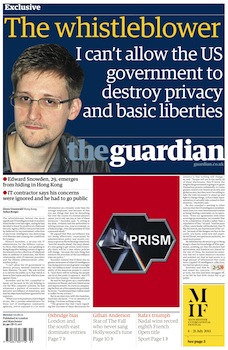The Guardian and the Washington Post newspapers have certainly boosted their readership these last few days as they roll out article after article containing sensitive or U.S. government classified data provided to them by a U.S. government contractor, Edward Snowden. To date, Snowden's revelations compromised three national security items.
FISA Court directed provision of telephone call data: The court which handles the various request formulated under the provisions of the Foreign Intelligence Surveillance Act (FISA) issued court orders which directed various service providers, Verizon was specifically identified to provide the metadata (call data records, time, location, duration, etc) for all calls within the United States which transited their network.
USG PRISM program: The leaked documents contained power point slides which implicated a number of companies as complicit in providing their user's data to the U.S. government.
Presidential Policy Directive PPD-20: This Top Secret document outline in detail the cyber operations policy of the the United States. 18 Pages of explicit detail on the roles and responsibility within the executive branch of government, explicitly the national security advisory and the national security staff within the White house and the intelligence and defense communities.

Snowden was interviewed on why he unilaterally decided to break his vow of secrecy and thus trust with the U.S. government which he signed as a condition of employment with his employer Booz Hamilton supporting a classified contract with the National Security Agency. Snowden articulates his motives in a deliberate and composed manner. He sequestered himself in a Hong Kong, apparently some weeks before the Guardian and Washington Post publicized the data he provided. He did so, to avoid the long-arm of the U.S. Department of Justice. He may have not calculated the extradition treaty currently in place with HongKong and no doubt the timing of the revelations was chosen to be concurrent with U.S. President Obama and China President Xi's meetings which were occurring in the Los Angeles area. He clearly views himself as the 2013 version of Daniel Ellsberg (Pentagon Papers).
A quick review of reaction to the first revelation, which can only be described as a wholesale vacuuming of U.S. telephone traffic records, has been universally in repugnance. The FISA court reviewed the Federal Bureau of Investigation (FBI) request filed under the provisions of the Patriot Act to compel via court order U.S. carriers to provide the meta data on all calls within the United States; this court order did not compel the carriers to provide the content of these calls, that would have required a separate review by the FISA court and the attendant court order. The court directed the carriers provide the data on behalf of the FBI to the National Security Agency (NSA). Many view this revelation to be more the action of a whistleblower.
A review of the second revelation, that of the PRISM program, implicated a number of U.S. companies and upon further review those taking the companies to task for their cooperation with the U.S. government were forced to retract, as the PRISM utilized the available data from those companies data streams and didn't necessarily need the company's cooperation to accomplish such. So conclusions were reached and fingers pointed based on incomplete data. Many view this revelation to also be that of a whistleblower, but as many others who understand the available nature of data in today's internet environment are viewing it as a means to effectively listen to social networks.
Interestingly, our elected officials who sit upon the House Permanent Select Committee on Intelligence and Senate Select Committee on Intelligence were both briefed and had opportunity to review the sum and substance of the collection under the purview of the Patriot Act, as well as the PRISM collection program. The checks and balances in government to keep the actions of the intelligence community in place apparently were operating as they should.
The third revelation, that of PPD-20, has not drawn the same level of attention as the first two revelations. This is unfortunate, as frankly, based on my own 30+years of prior service within the U.S. intelligence community I see this as the most egregious of the breaches. This information permits countries adversarial to the U.S. to digest the data, understand where the levers of engagement are with respect to cyber operations, both offensive and defensive. This information
is viewed by many as that of someone wishing to do grievous harm to the U.S..
Should he be arrested and extradited to the U.S. for violation of his secrecy agreement with the U.S. government? Should he be applauded and embraced as a heroic character? Is Edward Snowden a whistleblower patriot or a calculating misguided traitor seeking his 15 minutes of fame?
Guardian interview of Edward Snowden:
